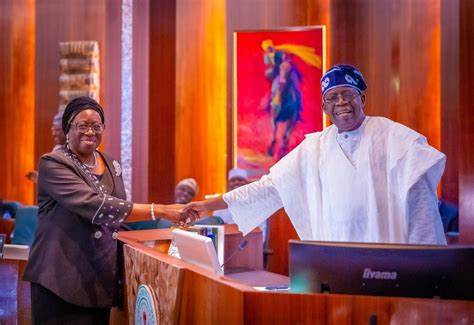By Kingston Magare
President Bola Tinubu Friday administered the oath of office to Justice Kudirat Kekere-Ekun, subject to confirmation by the Senate, she will assume office as the 23rd Chief Justice of Nigeria.
Justice Kekere-Ekun signed the oath of register at the State House in Abuja to mark the beginning of her tenure after the retirement of Justice Olukayode Ariwoola who recommended Justice Kekere-Ekun to President Tinubu for appointment as the Chief Justice of Nigeria.
Meanwhile, the Human Rights Writers Association of Nigeria (HURIWA) has raised concerns about the elevation of Justice Kekere-Ekun to the position of the CJN.
HURIWA pointed to her role in the controversial installation of Mr. Hope Uzordinma as governor of Imo State in 2019. Uzordinma was fourth in the order of ballot cast in the Imo election, but was promoted above other contestants by the Supreme Court when the poll won by Emeka Ihedioha of the People’s Democratic Party (PDP) was invalidate by a lower court.
Ihedioha won the election with a total of 273,404 votes ahead of the first runner-up. Uche Nwosu of the Action Alliance (AA), the first runner-up, polled 190,364. The All-Progressives Grand Alliance (APGA)’s Ifeanyi Ararume and All Progressives Congress (APC)’s Hope Uzondima came third and fourth with 114,676 and 96,458 votes respectively.
HURIWA also questioned Justice Kekere-Ekun’s integrity, stating that she has failed to address allegations of undeclared assets as required by law. HURIWA stated that Justice Kekere-Ekun’s elevation to CJN was influenced by political considerations, as she hails from Lagos State same as President Tinubu.
“The judiciary, as it stands, cannot deliver justice to ordinary Nigerians, as it appears to serve only the interests of the highest bidders and politically exposed persons,” HURIWA said in a statement signed by Emmanuel Onwubiko, HURIWA national coordinator.
“The transition from Justice Ariwoola to Justice Kekere-Ekun does not signal a positive change. Instead, it represents a continuation of the judiciary’s decline.
“Without a judiciary that is independent, transparent, and committed to upholding the rule of law, HURIWA argues that Nigeria’s democracy is at risk, and the hope for justice remains an elusive dream for the common Nigerian.”


